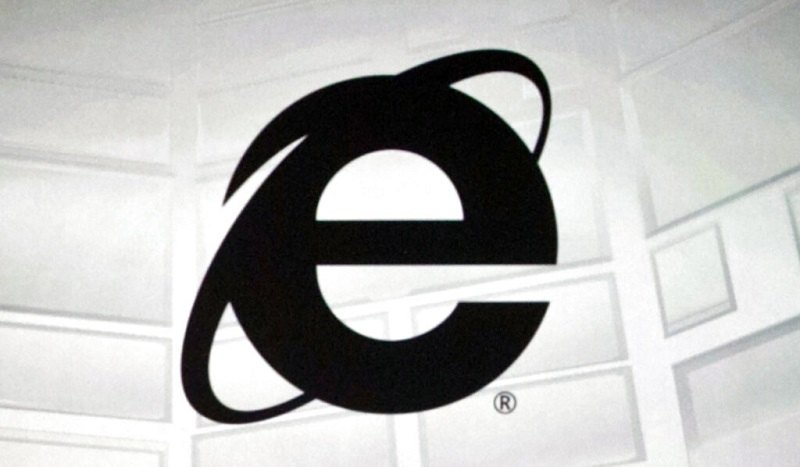
The Microsoft Internet Explorer logo is projected on a screen during a Microsoft Xbox E3 media briefing in Los Angeles, June 4, 2012. As of Wednesday, June 15, 2022, Microsoft will no longer support the once-dominant browser that legions of web surfers loved to hate and a few still claim to adore.
11:44 JST, June 15, 2022
SAN FRANCISCO (AP) — Internet Explorer is finally headed out to pasture.
As of Wednesday, Microsoft will no longer support the once-dominant browser that legions of web surfers loved to hate — and a few still claim to adore. The 27-year-old application now joins BlackBerry phones, dial-up modems and Palm Pilots in the dustbin of tech history.
IE’s demise was not a surprise. A year ago, Microsoft said that it was putting an end to Internet Explorer on June 15, 2022, pushing users to its Edge browser, which was launched in 2015.
The company made clear then it was time to move on.
“Not only is Microsoft Edge a faster, more secure and more modern browsing experience than Internet Explorer, but it is also able to address a key concern: compatibility for older, legacy websites and applications,” Sean Lyndersay, general manager of Microsoft Edge Enterprise, wrote in a May 2021 blog post.
Users marked Explorer’s passing on Twitter, with some referring to it as a “bug-ridden, insecure POS” or the “top browser for installing other browsers.” For others it was a moment for 90’s nostalgia memes, while The Wall Street Journal quoted a 22-year-old who was sad to see IE go.
Microsoft released the first version of Internet Explorer in 1995, the antediluvian era of web surfing dominated by the first widely popular browser, Netscape Navigator. Its launch signaled the beginning of the end of Navigator: Microsoft went on to tie IE and its ubiquitous Windows operating system together so tightly that many people simply used it by default instead of Navigator.
The Justice Department sued Microsoft in 1997, saying it violated an earlier consent decree by requiring computer makers to use its browser as a condition of using Windows. It eventually agreed to settle the antitrust battle in 2002 over its use of its Windows monopoly to squash competitors. It also tangled with European regulators who said that tying Internet Explorer to Windows gave it an unfair advantage over rivals such as Mozilla’s Firefox, Opera and Google’s Chrome.
Users, meanwhile, complained that IE was slow, prone to crashing and vulnerable to hacks. IE’s market share, which in the early 2000s was over 90%, began to fade as users found more appealing alternatives.
Today, the Chrome browser dominates with roughly a 65% share of the worldwide browser market, followed by Apple’s Safari with 19%, according to internet analytics company Statcounter. IE’s heir, Edge, lags with about about 4%, just ahead of Firefox.
Top Articles in News Services
-

Prudential Life Expected to Face Inspection over Fraud
-

Hong Kong Ex-Publisher Jimmy Lai’s Sentence Raises International Outcry as China Defends It
-

Japan’s Nikkei Stock Average Touches 58,000 as Yen, Jgbs Rally on Election Fallout (UPDATE 1)
-

Trump Names Former Federal Reserve Governor Warsh as the Next Fed Chair, Replacing Powell
-

Suzuki Overtakes Nissan as Japan’s Third‑Largest Automaker in 2025
JN ACCESS RANKING
-

Japan Institute to Use Domestic Commercial Optical Lattice Clock to Set Japan Standard Time
-

Israeli Ambassador to Japan Speaks about Japan’s Role in the Reconstruction of Gaza
-

Man Infected with Measles May Have Come in Contact with Many People in Tokyo, Went to Store, Restaurant Around When Symptoms Emerged
-

Prudential Life Insurance Plans to Fully Compensate for Damages Caused by Fraudulent Actions Without Waiting for Third-Party Committee Review
-

Woman with Measles Visited Hospital in Tokyo Multiple Times Before Being Diagnosed with Disease

























